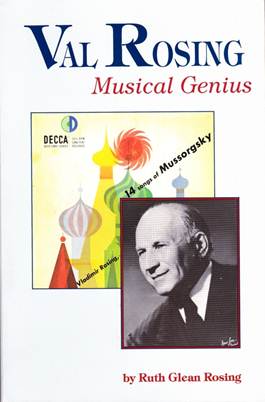
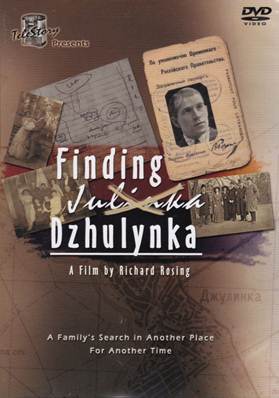
VAL ROSING MUSICAL GENIUS; AN INTIMATE BIOGRAPHY:
Ruth Glean Rosing; Sunflower University Press. (1993) Available online through various used or out-of-print book dealers, or through richard@rosing.us (total price including shipping USD 16.20)


FINDING DZHULYNKA: A Family’s Search in Another Place For Another Time
A Film by Richard Rosing www.film.rosing.us (2004)
Vladimir Rosing, Russian operatic and concert tenor, stage director (1890-1963)
A few years ago on an internet opera forum there was a posting asking if anyone had information on Russian-American tenor-stage director Vladimir Rosing. I sent the gentleman a scan of an autographed photo from my collection and of some letters of Rosing’s. The gentleman asking for this information was none other than Rosing’s son Richard. We had a lively exchange of information, and Richard Rosing sent me information on the published biography of his father written by Vladimir’s wife, and even more importantly the DVD he produced richly documenting Richard’s family’s trip to Russia/Ukraine in 2001 in search of his family’s past. Richard is a producer of documentaries and this DVD about his father was very well done and is highly recommended.
Vladimir Rosing was a name from that past that especially interested me. Almost fifty-five years ago when I as a young opera lover was collecting 78rpm vocal recordings I would always run into Rosing’s tan shellac Vocalion records when going through piles of 78’s in stores, second-hand shops, and junk shops. I always looked for details on the Vocalion record labels as my interest in Rosa Raisa was already taking wing, and she recorded from 1920-1924 for this company with its distinctive brown label. Rosing’s Russian arias and songs were often found during these haunts.
Rosing’s early recordings are very beautiful; he was initially trained by Maryinski baritone Joachim Tartakov, and later in Paris by Jean de Reszke, and even took lessons from de Reszke’s own teacher, the elderly Giovanni Sbriglia. In London he studied with George Power, a Lamperti student. Therefore, it can be stated that Rosing ‘s studies were influened by two of the leading teachers of the nineteenth-century, Lamperti and Sbriglia. In 1910, the twenty-year old Rosing made his St. Petersburg concert debut on a program shared with the very young and rising violinist Jascha Heifetz.

When I read Ivor Newton’s musical biography At The Piano, Ivor Newton, The World of an Accompanist there was an extensive chapter on Rosing as Newton considered him one of the greatest artists it was his honor to accompany; others were Chaliapin, Supervia, Flagstad and DelosAngeles to name just a few stellar names. Newton is not starry-eyed about this unique artist: "Rosing brought to London a style of song and of singing London had never heard before, a stark, realistic Russian song, put over in a stark, realistic Russian manner. London concert halls and drawing rooms... lapped up this neat vodka as avidly as a man who has spent months in the desert or a monastery. The fellow, it was plain, was a savage, a moujik. A vagabond of the Steppes, a wastrel from the Siberian snows. Men were shaken out of their complacency. Women shuddered—and adored him.
Rosing had one of the vividest and most magnetic personalities I had ever come across; rarely have I known anyone who could hold an audience in such a sheer ecstasy of enchantment through a whole recital. A Rosing audience was unlike any other. There was electricity in the air and people crouched forward in their seats as though they were watching some fierce and terrifying melodrama. With Rosing, nearly every song was a melodrama—sometimes a grand guignol melodrama. He acted every song; often he overacted it, sometimes he all but clowned it. The purists were scandalized. The man could do everything but sing, they said. He was a mountebank, a buffoon. He had no right in a concert hall; he ought to be on a fairground. It was outrageous, unparalleled. So it was. Perhaps they were right, but it came off, because, despite all his eccentricities, Rosing was never cheap; in everything he did there was such an overpowering impression of stern, unflinching sincerity. The man simply threw himself into his music and its poem. He sang—eyes closed and feet wide apart, like a blind goalkeeper—not only with his voice but with his heart, brain, body, hands and feet. If he tore a passion to tatters, you felt that that particular passion was much more effective in tatters than intact. If he made a mess of a song, well, it was a glorious mess."
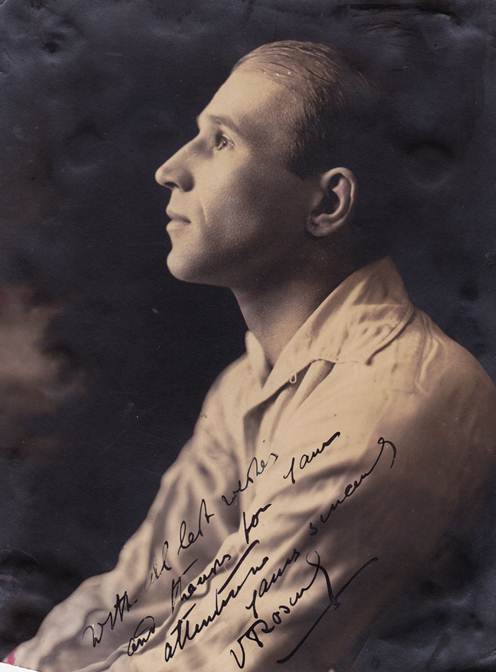 (photos courtesy Charles Mintzer collection)
(photos courtesy Charles Mintzer collection)
The biography Val Rosing, Musical Genius was written by Rosing’s fifth wife Ruth Glean Rosing reads as more of the story of an interesting man with multiple interests and an extraordinary, varied life than that of an operatic luminary. I find it interesting that this 1993 biography was not one of the titles that dealers of opera books promoted in those days when numerous opera singer biographies were still being published, and I only learned about its existence from his son Richard. This 243 page book has 32 short chapters, each dealing with another facet of Rosing’s remarkable career, plus a discography and a huge index. The ten page index has references to a mind-boggling array of opera artists, opera companies, other musicians, scientists, inventors, politicians, movie stars and promoters. There is clearly a reason for this as Rosing was not only a singer and later a stage director, but he created small ground-breaking opera companies in both the UK and USA, directed the operatic scenes in many MGM movies, most notably Interrupted Melody, the film biography of Marjorie Lawrence. He also directed Beverly Sills in the New York City Opera premieres of Tchaikovsky’s Golden Slippers, Mozart’s Impressario, and Moore’s The Ballad of Baby Doe. He was the stage director of the NYCO’s highly-regarded production of Prokoviev’s The Love For Three Oranges. It was his idea in the 1950 production of Faust to use two tenors for the opening scene, the aged and the younger Faust.At Lyric Opera of Chicago in addition to the 1962 production of Prince Igor with Boris Christoff and Igor Gorin, but most remembered for the spectacular US debut of Russian dancer Rudolf Nuryev in the Polovstian dance sequence, he also directed Il tabarro with Gobbi, L’elisir d’amore, L’amore dei tre re with Kirsten, Weede and Rossi-Lemeni, Cavalleria rusticana with Simionato, Pagliacci with Gobbi as Tonio, but Cornell MacNeil singing the Prologue and Silvio, Lucia, Turandot with Nilsson and di Stefano, Boris with Christoff, and Thais with Leontyne Price. This man met and was honored by Presidents Harding, Coolidge, Hoover, Roosevelt, Truman and Eisenhower, the earlier ones through his work with the American Opera Company (Rochester, New York-based, opera in English, supported by his inventor friend George Eastman, founder of Kodak), and the later presidents for his work during World War II producing entertainment for the troops. These career trophies are only mentioned to suggest the sweep of this artist’s multi-faceted career.
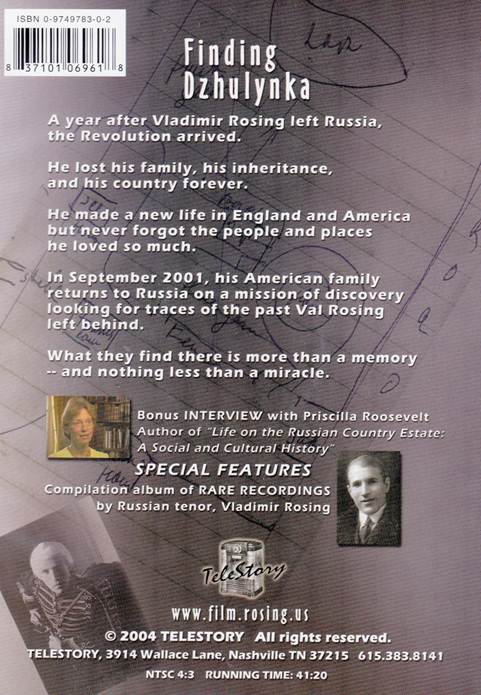
The DVD Finding Dzhulynka is son Richard’s desire to locate Rosing’s homes in Russia and the Ukraine. Through meticulous research and Russian contacts Richard brought his sister and her son to Russia only a few days after the 9-11 attacks on the World Trade Center. You can see the still-smoking site in the distance from Newark airport while taking a plane to Helsinki. In Saint Petersburg they locate one of the Rosing family homes, but the focus of the documentary is the effort to locate the Rosing family’s country estate in the Ukraine. Working with Czarist era and Soviet maps and through serendipity they locate the family estate, now in horrible condition. Throughout the discovery process laid out in this documentary, in the background Rosing is singing Russian songs and arias, beautifully and evocatively done. There are additional features: two years later locating remaining relatives not seen or heard from since the 1917 revolution, a conversation with an academic expert on Czarist-era country estates and culture, and a group of Rosing’s 1937 song recordings.
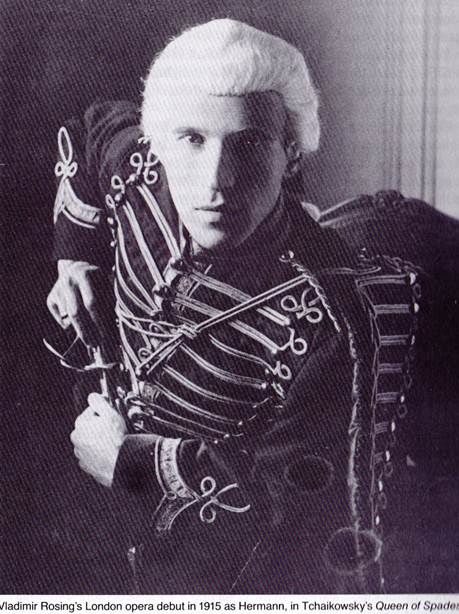
There is on Wikipedia an extensive article on Rosing with more career details as well as many of his recordings that can be accessed through the external link to Russian Recordings; I believe that Richard Rosing authored that essay. http://en.wikipedia.org/wiki/Vladimir_Rosing
Vladimir Rosing had other children from previous marriages. One son had a successful career as a popular singer mostly in the UK, later tried his skill at opera and operetta. In 1955 under the name Gilbert Russell he sang Ernesto in Don Pasquale and Fenton in The Merry Wives of Windsor at the New York City Opera, the later directed by his father Vladimir. His biography can be found: http://www.valrosing.com/gilbertrussell.html
Charles Mintzer